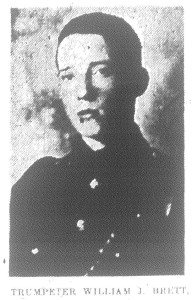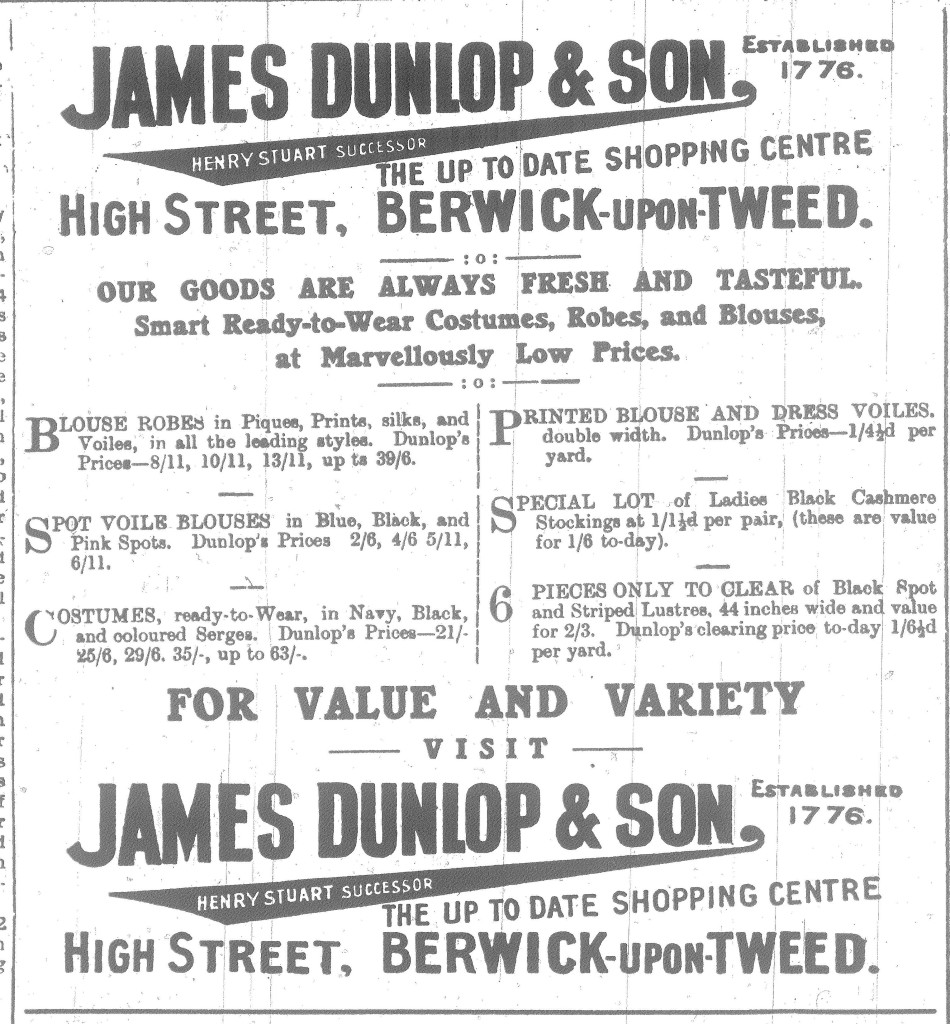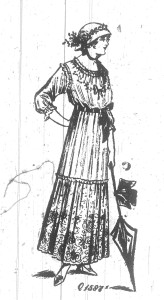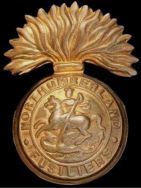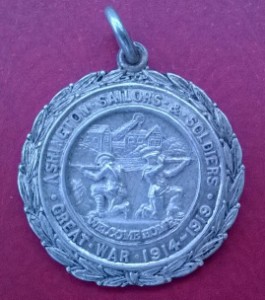BERWICK ADVERTISER, 16 JULY 1915
BERWICK GRAMMAR SCHOOL SPORTS
Under ideal weather conditions Berwick Grammar School held their annual school sports in the Pier Field on Thursday afternoon. There was a large attendance of parents and friends and the various events were keenly contested. The Rev. R. C. Inglis and Mr A. L. Miller acted as judges and the two house masters, Mr Pearce and Mr Woodcock officiated as starters and handicappers. At the conclusion of the sports the prizes were presented to the successful competitors by Commander F. M. Norman, R.N., in the unavoidable absence of the Mayoress (Mrs T. Wilson). Before presenting the prizes Captain Norman said he had for many years presented the prizes to the boys in school, but this was the first time he had had the privilege and honour of presenting the prizes at the annual school sports. He had to congratulate them on the splendid weather they had during the afternoon, and he was sure it had been a pleasure to all to watch the various events. It was of inestimable benefit to the boys to take part in such games, and he hoped that it would help them to become good citizens and soldiers. It gave him great pleasure to announce that no less than 100 old boys of the school had their names inscribed on the roll of honour, and were serving their King and Country. (Applause.)
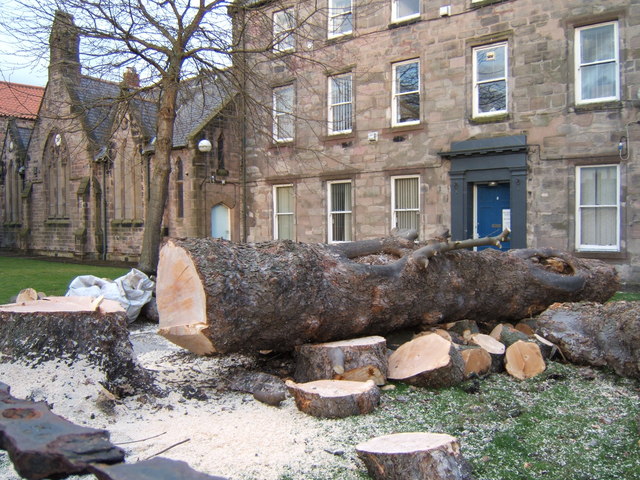
In presenting the prizes, Captain Norman referred to the fact that the first prize for the Cross Country Run had been presented by Pte. T. Boal, 7th N.F., who was at present serving in the trenches. Private Boal was last year the winner of the Norman Challenge Bowl, and it was gratifying to know that, while he was in France, he had not forgot his old school. He hoped Pte. Boal would be spared to come back amongst them. (Applause.) Mr A. L. Miller proposed a hearty vote of thanks to captain Norman for presenting the prizes. The name of Captain Norman had been long associated with the school, and he was sure that wherever and whenever old boys and present pupils thought of Berwick Grammar School, they would always remember Captain Norman, who had taken such a kindly interest in them. (Applause.) The boys gave three hearty cheers for Captain Norman, and the singing of “God Save the King” brought the proceedings to a close.
Postscript: the above article refers to a Pte. T. Boal, 7th N.F., this should have read Pte. J.E. Boal who was later promoted to Corporal 7th Northumberland Fusiliers. The T. Boal mentioned in the article was his father.
Corporal John Edgar Boal 7th Northumberland Fusiliers
BOAL, Cpl. John Edgar, 2074, M.M. 7th Bn. Northumberland Fusiliers, attd. 149th T.M. Bty. Accidently killed 8th Dec., 1916. Age 20. Son of Thomas W. and Lily Boal, of 12, West St., Berwick-upon-Tweed. Educated at Berwick Grammar School. The notice below shows the presentation of the Military Medal to Mr Thomas. W. Boal, father of the late Corporal John Edgar Boal dated 14th April 1917.
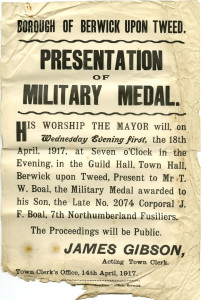
GOLDEN WEDDING AT SPITTAL
A worthy old Spittal couple in the persons of George Elliott, fisherman, residing in Gibson’s Row, and his good lady celebrated the 50th anniversary of their marriage on Monday, and were the recipients of many presents and congratulations from their family and friends.

The family of George Elliott from the 1901 Census:
Name: George Elliott
Age: 56
Spouse: Jane Elliott
Birth Place: Northumberland, Spittal
Civil parish: Tweedmouth
Ecclesiastical parish: Spittal St John the Evangelist
County/Island: Northumberland
Registration district: Berwick
Household Members:
George Elliott aged 56, occupation fisherman. Jane Elliott aged 56. Richard Elliott aged 27, occupation fisherman. George Elliott aged 25, occupation Salmon fisher. Joseph Elliott aged 16, occupation labourer. Thomas Elliott aged 13, Ellen Elliott aged 23 and Isabella Elliott aged 19, occupation Clay Pipe Moulder,
The family of George Elliott from the 1911 Census:
Name: George Elliott
Age: 65
Birth Place: Tweedmouth, Northumberland, England
Civil parish: Tweedmouth
County/Island: Northumberland
Street Address; 6B East St, Spittal, Berwick
Marital status: Married
Occupation: Fisherman
Registration district: Berwick
Household Members:
George Elliott aged 65, occupation fisherman. Jane Elliott aged 65. Joseph Elliott aged 26, occupation fisherman. Thomas Elliott aged 23, occupation Cooper, Herring Curing.
EGG SUNDAY IN SPITTAL
Magnificent collection
1,153 Eggs as a gift for the Wounded
What may very truly be described as a “unique service,” was held on Sunday last in the Congregational Church, Spittal, when an effort to procure eggs for the use of the wounded soldiers quartered in the Borough was brought to a most successful issue. The special service was held in the evening when a crowded congregation, gathered for worship, which was conducted by the minister of the Church, the Rev. Frederick T. Williams. The praise portion first celebrated was fittingly rendered by the choir of the Church, and included the anthems, “Blessed is he that Considereth the Poor”, and “The Lord is Almighty” Mr J. N. Peace, B.A., also contributed a solo. Immediately preceding the hymn “We give Thee but Thine Own, “ the Minister said he thought that would be the most fitting moment in the service to express his sense of gratitude for the magnificent response which had been made to his appeal. In a very appropriate manner he said:- “My dear friends, let me at this point in the service express my sincere thanks for the truly magnificent manner in which you have responded to my appeal. You have far exceeded my expectations, but then you have been constantly doing that during the term of my pastorate in this place. I know you are all wondering and some of you have been making various calculations as to the number of eggs which you see so nicely displayed in the front of the Church. Including those brought to the service this evening I have received no less than eleven hundred and fifty-three. Truly a generous gift from loving hearts. Why have you done this? The answer comes very readily. I know the one all compelling motive which has moved you. True there are one or two motives of a secondary nature. I know you like to do your best for every appeal made by the Church. I know you like to encourage the man who for the time being is your minister; and you have never given me cause for greater thankfulness than you have today, and I am proud of you; but these considerations do not constitute the chief reason why you have done this thing. You have done it, because you have husbands, sons, brothers, sweethearts serving at the Front. Some of them have been wounded and they are lying in hospitals in different parts of England, and you know that our countrymen in every town and village are doing what they can to minister to their comfort. As you would like them treated as you know they are being treated, even so you are seeking to do for those in your own midst who having given themselves for their country’s service, have returned stricken from the field of battle. God bless you everyone, and in the name of those for whom your gifts are intended please accept my heartfelt thanks.
After the hymn had been sung a suitable prayer was offered, and then the Reverend gentleman preached a most appropriate sermon…


